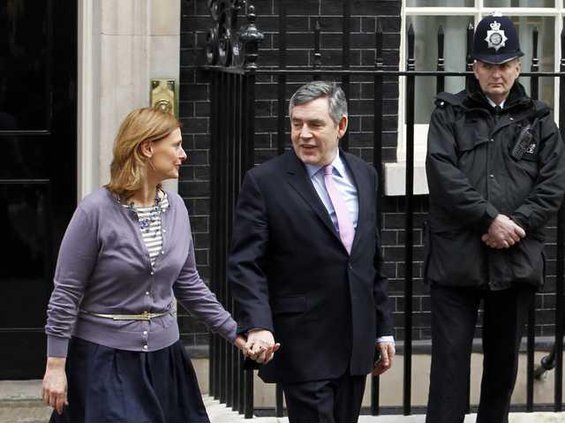LONDON - Britain will hold a national election May 6, Prime Minister Gordon Brown announced Tuesday. The bitterly contested race will be dominated by a recession-wracked economy and a sense that 13 years of Labour rule may be coming to an end.
Brown met with Queen Elizabeth II at Buckingham Palace to ask her to dissolve Parliament, marking the start of the general election campaign. Parliament will shut down next Monday after concluding business.
Brown, who has never won a national election as leader of his party, has a difficult task ahead, with Labour Party trailing in opinion polls and Britain's economy still fragile after the worst recession in decades.
Britain's opposition Conservatives - the party of former Prime Ministers Margaret Thatcher and Winston Churchill - hope to win a national election for the first time since 1992.
Brown's Labour Party is as much as 10 points behind the Conservatives and their articulate leader David Cameron in some opinion polls, but an unusual electoral map means the outcome of the election is still uncertain.
Britain's struggling economy and enormous debt will dominate the campaign. Both Labour and the Conservatives say they will trim spending and slash the country's 167 billion pound ($250 billion) deficit - but they differ on how deep, and how soon, to make cuts.
Brown promised to "fight on behalf of hard-working families on middle-class and modest incomes," and said only Labour, not the Conservatives, could be trusted to keep the economy out of a possible second downturn.
"Britain is on the road to recovery, and nothing we do should put that recovery at risk," he said. "That is why I am asking the British people for a clear and straightforward mandate."
Defeat would bring to a close a British political era that began with Tony Blair's landslide 1997 election victory, which returned Labour to power and brought an unprecedented three successive electoral triumphs for the center-left party.
Brown - often criticized for his lack of magnetism but admired for his intellectual prowess - is seeking to woo voters stung by the impact of the financial crisis, weary of the war in Afghanistan and furious at a scandal over lawmakers' inflated and fraudulent expense claims.
The 59-year-old, who succeeded Blair in 2007, said he'll stake his chances on his record in guiding Britain through the global economic meltdown.
An ICM poll published late Sunday by The Guardian newspaper showed Labour closing in on its main rival - climbing four points to 33 percent with the opposition Tories down one point with 37 percent. Other polls, however, showed larger Tory leads.
Cameron said his task was to convince ordinary Britons he can lead an economic revival and fight for "the great ignored ... the honest, hardworking people of our country."
"(This election) is about the future of our economy, it's about the future of our society. It's about the future of our country," said Cameron, standing outside Parliament next to his pregnant wife Samantha. "It's the most important election for a generation, and it comes down to this: You don't have to put up with another five years of Gordon Brown."
The 43-year-old Cameron has sought to replace his party's fusty, right-wing image with a more modern brand of "compassionate Conservatism," and drawn more women and ethnic minorities to a party long dominated by affluent white men like himself.
His party has pledged to reverse Labour's planned hike to national insurance, a payroll tax, and implement about 6 billion pounds in spending cuts this year. Labour says major cuts should be deferred until 2011 to give the economy more time to recover.
Cameron's party also plans to cut the number of lawmakers, offer tax breaks to married couples and overhaul Britain's education system. Brown promises a public referendum on changing Britain's voting system, improved cancer treatment and a new high speed national rail network.
The major parties agree on international issues - both would keep British troops in Afghanistan and seek to preserve the so-called "special relationship" with the U.S.
Disillusionment at mainstream politics following an expense claims scandal could benefit small and fringe parties in the election, including the Greens and the racist British National Party - neither of whom currently hold a House of Commons seat.
The campaign will also include the first-ever televised debates between the leaders of Labour, the Conservatives and the third-place Liberal Democrats.
With his bicycle riding, informal "call me Dave" manner and young family - his wife is expecting their fourth child in September - Cameron appears best placed to benefit from a personality-centered contest. Some see a parallel with Labour's former savior Blair, whose confident but easy style helped sweep his party to power in 1997.
Yet because of the quirks of Britain's electoral system, the Conservatives will need a significant margin to ensure a majority of the House of Commons' 650 seats and oust Brown.
Many recent opinion polls suggest the election could result in a hung Parliament - in which no party has an absolute majority - for the first time since 1974. Those results could mean a second national election later this year.
While voter turnout in the election is likely to hover around 60 percent, Britain's enthusiasm for political betting remains strong. Bookmakers expect 20 million pounds ($30 million) to be wagered on the election before May 6. They said the most likely outcome was a Conservative majority, followed by a hung Parliament.
Bookmaker Paddy Power said the Conservatives were 1/6 favorites to win, with Labour at 7/2. The odds of a hung Parliament were 13/8.
Spokesman Darren Haines said for bookies "the most favorable outcome would be a Lib-Dem win" - a 200/1 longshot.

